Contents
Meadow champignon, also called “pecheritsa” (lat. Agaricus campestris) – a large mushroom with a white cap, which is hard to miss on a green background of grass. Among mushroom pickers, this mushroom is popular not only due to its excellent taste, but also due to the high content of highly digestible proteins, as well as vitamins and minerals. In particular, champignons are rich in microelements necessary for the body, such as phosphorus and potassium, which are responsible for the normal functioning of the cardiovascular system.
However, do not forget that the meadow champignon has poisonous counterparts that are dangerous to eat. Therefore, it is important to know what real champignons look like and be able to distinguish them from false mushrooms by external signs.
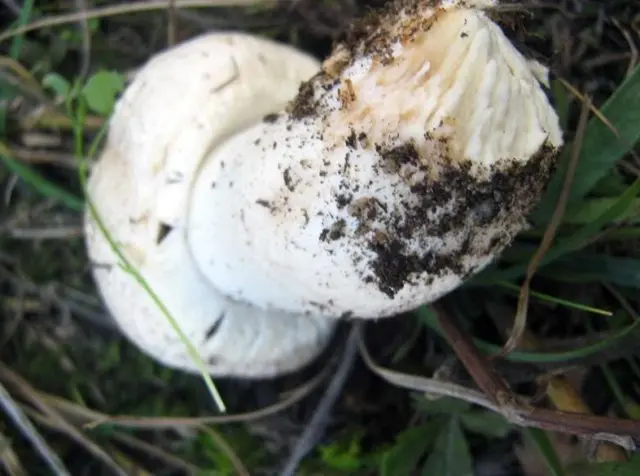
Meadow champignon has poisonous counterparts
What does meadow champignon look like
Pecheritsa mushroom, the photo and detailed description of which is given below, is the most popular all over the world. Pecheritsy were first cultivated in Italy about a thousand years ago. In Europe, champignons began to be grown in the 17th century in France, where they were considered a delicacy product, along with truffles.
Meadow champignon has a light (white, dirty gray or cream) color of the cap and legs. The flesh on the cut is white, acquiring a pinkish tint when pressed, elastic, dense, becomes soft and yellowish with age. Mushrooms have a pleasant characteristic aroma, reminiscent of almonds or anise, and a rich mushroom, slightly sweet taste.
Below is a detailed description and photo of common champignon.
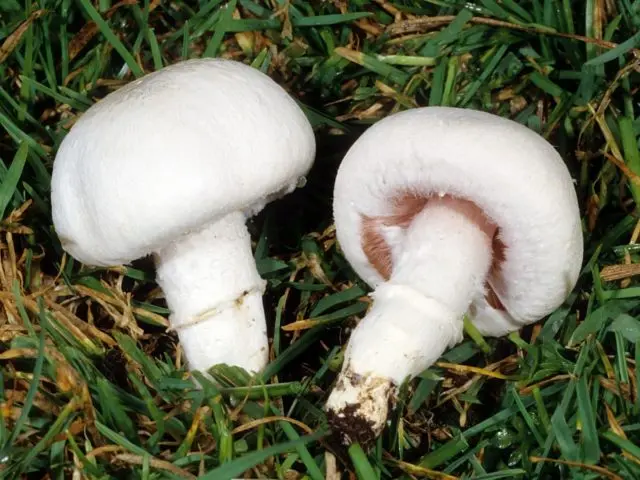
Meadow champignon smells pleasantly of almonds and has a slightly sweet taste.
Cap Description
The cap is spherical or hemispherical, dry, has a diameter of 8 to 15 cm. In young individuals, the edge is turned down, and the cover partially covers the plates. At maturity, the cap is covered with small scales, forming a brownish spot in the center. The plates of the meadow champignon are frequent, thin and wide (up to 12 mm). At an early age, they are white, with time they acquire a pinkish tint. In mature mushrooms, they become red-brown or brown, with a purple tint.
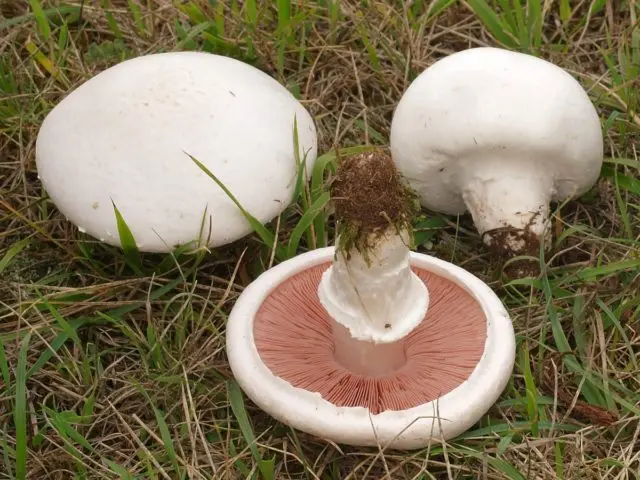
In the meadow champignon, the cap plates acquire a red-brown color over time.
Description of the leg
The leg of a meadow champignon 1-2 cm wide grows from 3 to 10 cm in height. The shape is cylindrical, with a thickening at the base (sometimes it can narrow). The pulp is solid, fleshy, without cavities, fibrous, light in color. In a mature mushroom, it may acquire a brown tint at the base. A clear ring is visible on the leg, located closer to the middle, with age it disappears.
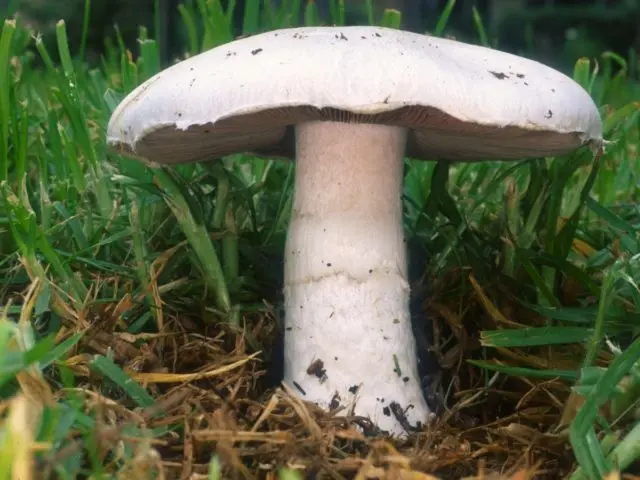
The ring on the leg of the meadow champignon disappears over time
Types of meadow champignons
In total, there are four types of meadow champignons in nature:
- Ordinary – an edible mushroom with a cap diameter of 9-12 cm and a stem height of 8-11 cm, which has a wide white ring in the center.
- Field – widely used in cooking, has a hat up to 20 cm in diameter and a leg up to 11 cm high.
- Double ring (sidewalk) – an edible, medium-sized representative of the family, a dirty gray hat rarely grows more than 10 cm in circumference.
- Bernard – also applies to edible mushrooms, a scaly soft cap, reaching 12 cm in diameter, cracks over time and becomes flat.
It is important to be able to distinguish edible mushrooms from poisonous ones and not confuse them with pale grebe or white fly agaric, which at a young age are very similar to real meadow champignons.
Where and how do meadow champignons grow
Meadow champignon is distributed throughout Our Country and can be found from late May to early October. Prefers open areas and humus-rich soils. Abundantly appears after rains in meadows, pastures (therefore, the name “horse mushroom” can sometimes be found), as well as in gardens, vegetable gardens, parks and roadsides. It grows both singly and in groups, forming wide rings.
Twins and their differences
Meadow champignon has false twins, very similar in appearance. The following are photos and descriptions of doubles of meadow champignons. It is important to know how to distinguish them from an edible mushroom in order to avoid the danger of poisoning.
Champignon flat cap
This representative of the champignon family is inedible, moreover, it is poisonous. After eating, after two hours, signs of poisoning are observed.
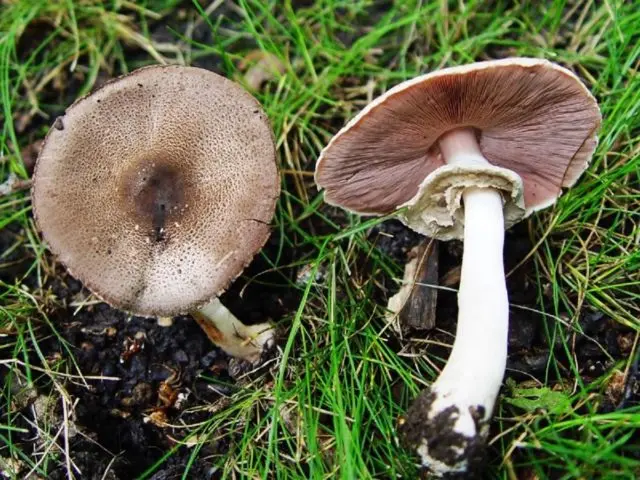
Champignon flat cap is considered a poisonous mushroom and is not suitable for food.
The cap is covered with characteristic scales, greyish-brown in color, converging towards the center and forming a dark spot. A fibrous stalk 1-1,2 cm thick reaches a length of 6-9 cm, a tuberous thickening is visible at the end.
red champignon
This poisonous mushroom is also called the yellow-skinned cauliflower. It is very similar to what meadow champignons look like, however, the hat is covered with a yellowish skin with brownish patches closer to the center. It can be distinguished from real champignon by the white pulp of the stem, which is yellow at the base and emits an unpleasant phenolic odor during heat treatment.
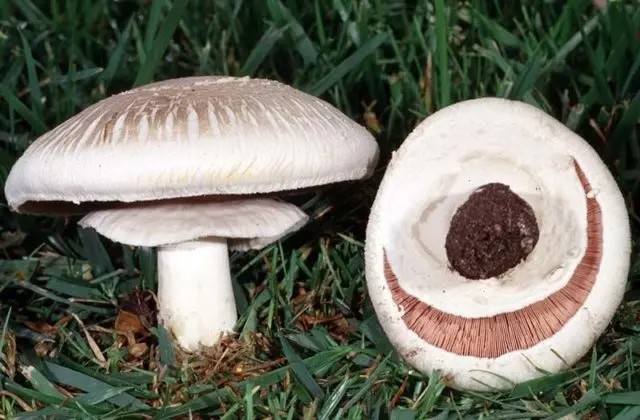
Red champignon is poisonous, it is easily recognizable by brownish inclusions on the cap
At a young age, the caps are rounded, but over time it becomes bell-shaped. It is the young yellow-skinned pecherits that fall into the basket of amateur mushroom pickers.
Edible Pecheritsa mushroom or not
Meadow champignon is an edible mushroom that belongs to the second category in terms of gastronomic qualities. Delicious and fragrant, can be eaten raw. According to the content of digestible protein, it is comparable to a porcini mushroom, and therefore it is widely popular in cooking.
There are many ways to prepare meadow champignons: they are boiled, fried, baked in the oven, pickled, salted and used as the main ingredient for making salads.
How to cook meadow champignons
Pecheritsy are widely used in cooking, as the mushroom goes well with most common and frequently consumed foods. It is served with meat and vegetable dishes fried or grilled, various mushroom soups, pates, sauces, casseroles, appetizers and salads are prepared.
How to choose, store and prepare champignons for cooking:
- mushrooms must be whole, without spots and dents;
- fresh meadow champignons can be stored in the refrigerator for no more than five days;
- before eating, clean the leg and hat from dirt and rinse under running water;
- in the fresh air, the pulp of the pecherits quickly darkens, therefore, after slicing, it is necessary to immediately proceed to cooking.
The most popular recipes with photos and descriptions of how to cook meadow champignons are given below.
How to cook fried meadow champignons with sour cream and onions
The most common way to cook meadow champignons is frying. It’s easy, fast and incredibly delicious.
You will need:
- 0,5 kg of meadow champignons;
- 1 large onion;
- 2 garlic cloves;
- 50 g butter;
- 2 st. l. sour cream.
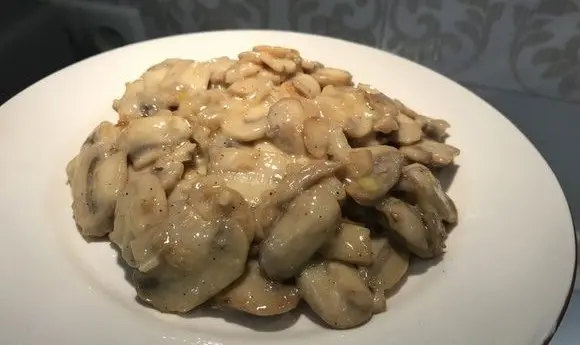
Fried meadow champignons are tender and fragrant
Method of preparation:
- Clean the mushrooms and cut into thin slices.
- Heat a deep frying pan, add oil and as soon as it melts, add meadow champignons.
- After the liquid evaporates, add finely chopped onion, squeeze garlic through a press, pepper and salt.
- When the pecherits become golden, reduce the heat, add sour cream and simmer under the lid for 10 minutes.
Mushrooms will turn out tender, fragrant and, thanks to garlic, spicy.
How to cook meadow champignons in the oven
To cook mushrooms in the oven, medium-sized specimens should be selected so that they are well baked.
You will need:
- fresh ovens;
- dried aromatic herbs (any);
- 1 Art. liter. lemon juice;
- 1 Art. l soy sauce;
- 2 Art. l. vegetable oil.
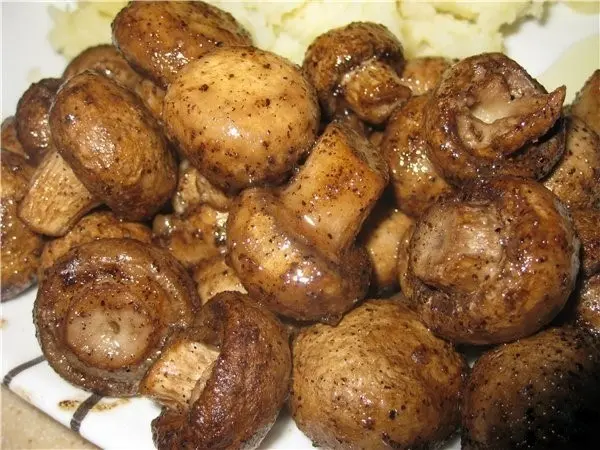
For cooking in the oven, it is better to select small specimens of meadow champignons
Method of preparation:
- Wash mushrooms and dry with paper towels.
- In a deep bowl, mix the pecherits with all the ingredients.
- Put on a baking sheet in one layer and send to bake in the oven at a temperature of 180 ° C for 15-20 minutes.
Mushrooms cooked in the oven will turn out juicy, saturated with the aroma of herbs.
How to cook a salad with mushrooms
This salad is made from raw meadow champignons. The dish turns out incredibly tasty, bright and juicy.
You will need:
- 400 g fresh meadow champignons;
- 3 pcs. sweet pepper (red, yellow and green);
- 1 red onion;
- 100 ml of olive oil;
- 50 ml wine vinegar;
- 2 Art. l soy sauce;
- dry spicy herbs (oregano, Italian, dill).
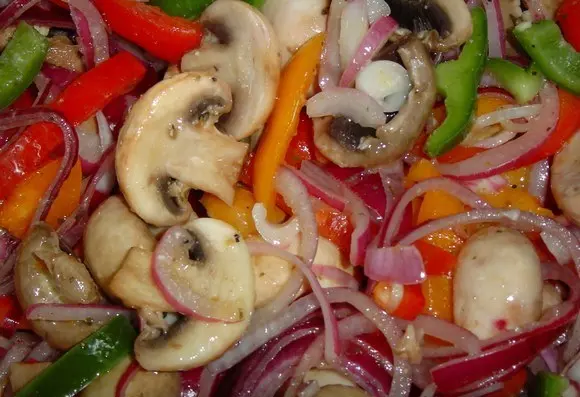
Salad is better to cook from young ovens
Method of preparation:
- Cut the pepper into strips, onion into half rings, put everything in a bowl.
- Cut the mushrooms into several pieces and send to the vegetables.
- Mix soy sauce, wine vinegar, oil and spices and pour the resulting dressing into a bowl with vegetables and ovens.
- Salad ingredients should marinate for half an hour, after which the finished dish can be served on the table.
Such a salad should be prepared only from young ovens bought in a store. Meadow champignons collected in nature are best subjected to heat treatment beforehand.
How to cook soup with mushrooms
Meadow champignon soup will turn out not only tasty and fragrant, but also nutritious.
You will need:
- 450 g mushrooms;
- 500 g of potatoes;
- 1 small carrot;
- 1 onion head;
- greens.
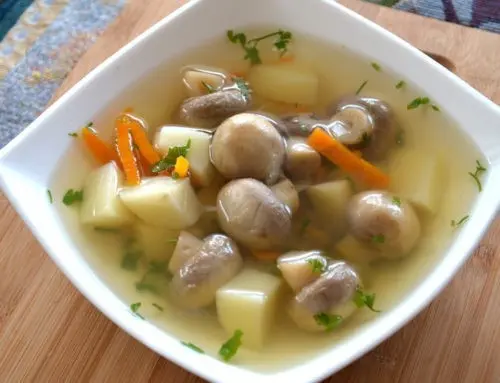
Mushroom soup is not only tasty, but also nutritious
Method of preparation:
- Wash and cut vegetables. Cut large mushrooms in half, leave small ones whole.
- Fry carrots and onions in oil for 3 minutes, add mushrooms and cook for another 5-7 minutes.
- Boil 2,5 liters of water in a saucepan and add the diced potatoes.
- When the water boils again, transfer the fried vegetables and meadow mushrooms from the pan, and cook after boiling for 15 minutes.
Pour the finished dish on plates and sprinkle with fresh herbs.
How to pickle meadow champignons for the winter
Pickled pecheritsy is a versatile and popular winter preparation. These mushrooms go well with meat and vegetable dishes.
You will need:
- 1,5 kg of meadow champignons;
- 200 ml of table vinegar;
- 2 Art. l salts;
- 2 Art. l sugar;
- 3 pcs. bay leaf;
- 5 peas of black pepper.
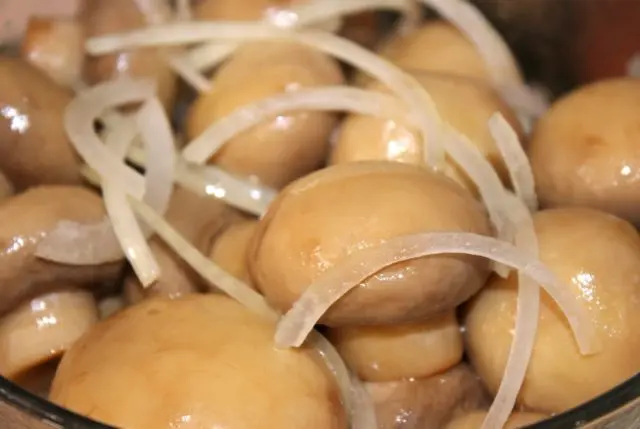
Pickled champignons can be served with meat and vegetable dishes
Method of preparation:
- Clean the mushrooms from dirt, rinse under running water and dry with a paper towel.
- Boil two liters of water, add pepper, bay leaf, dissolve salt and sugar, add vinegar.
- After waiting for the boil again, pour the mushrooms and cook over low heat for 40 minutes.
- Arrange in jars and pour marinade over. Fix covers.
Pickled pecheritsy can be stored throughout the winter in a pantry or on a glazed balcony.
How to freeze
Freezing is one of the most common methods for harvesting mushrooms for future use. Meadow champignons should be sorted out, cleaned of litter and quickly rinsed under running water so that they do not have time to absorb moisture, and then pat dry with a paper towel.
Arrange prepared, dry ovens on a flat surface (you can take a baking sheet) in one row and place in the freezer for 10-12 hours. Frozen pecherits are stored in a bag or container at a temperature of -18 ° C.
Preservation of meadow champignons for the winter
To preserve the ovens for the winter, you should choose fresh, strong, medium-sized mushrooms of approximately the same size.
You will need:
- 1 kg of mushrooms;
- 1 L of water;
- 1 st. l. vegetable oil, the same amount of table vinegar;
- 25 grams of sugar;
- 30 g salt;
- 4 bud of carnation;
- 4 pcs. bay leaf;
- 5 pieces. allspice.
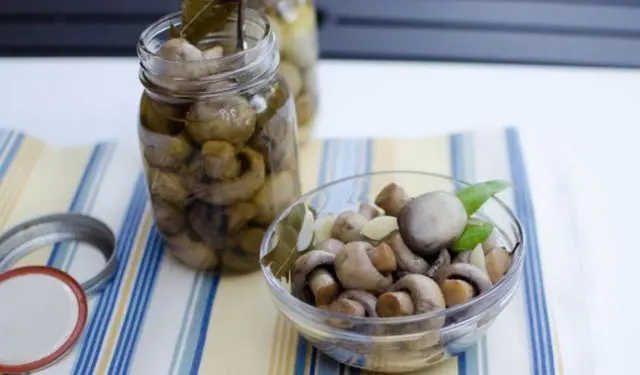
Canned meadow champignons can be stored for up to 10 months in a cool place.
Method of preparation:
- Boil the pecheriki for 10 minutes.
- As soon as they settle to the bottom, add spices, salt, granulated sugar, oil and vinegar and cook for another 15 minutes.
- Arrange in jars, pour marinade on top and pasteurize in boiling water for 20 minutes, then roll up.
Such mushrooms can be stored for up to 10 months in a cool place (on the bottom shelf of the refrigerator or in the cellar).
Useful properties of meadow champignons
Regular consumption of summer meadow champignons has a very beneficial effect on the health of the whole organism. These mushrooms contain a lot of useful substances necessary for a person, such as:
- amino acids (there are 18 of them in total);
- vitamins (B1, B2, B9, B12, C, E, D, PP);
- organic acids (folic, oxalic);
- minerals and trace elements (iron, phosphorus, calcium, magnesium, potassium, iodine, selenium).
In addition, the pulp of meadow champignons contains lecithin, which has a positive effect on the functioning of the nervous and cardiovascular systems.
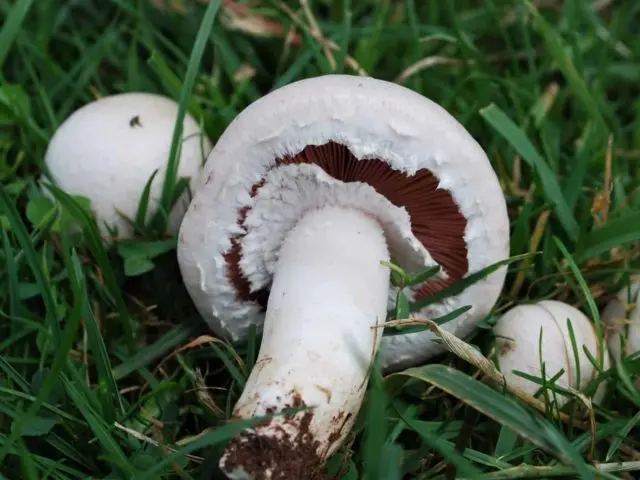
Meadow champignons contain vitamins, amino acids and trace elements
Application in folk medicine
The beneficial properties of champignons have long been used in folk medicine to treat diseases such as influenza, bronchitis, tracheitis and bronchial asthma. The pulp of the fruiting body of meadow champignons has antiviral, expectorant and anti-inflammatory properties.
An extract from these mushrooms successfully treats purulent skin diseases, ulcers, psoriasis, since it has a disinfecting effect. In addition, the antioxidants that are part of the meadow champignons have a rejuvenating effect on the body.
Limitations and contraindications
Mushrooms are considered the safest mushrooms and have no contraindications (except for individual intolerance). However, it is still not worth abusing, because they contain chitin, which is poorly absorbed by the body. Therefore, before eating meadow champignons, it is recommended to subject them to heat treatment.
It is undesirable for children under 12 years of age to introduce mushrooms into the diet, since they are heavy foods. Also, with caution, champignons should be eaten by people with gastrointestinal diseases.
Growing meadow champignons at home
Meadow champignons can be cultivated at home. They love coolness and high humidity, so they will feel good in boxes or containers located in the basement, cellar, shed. The containers must be at least 20 cm deep. Mycelium can be purchased at a specialized store or you can take a natural mycelium. The substrate for planting should be rich in humus, since the stoves grow quickly and require active nutrition.
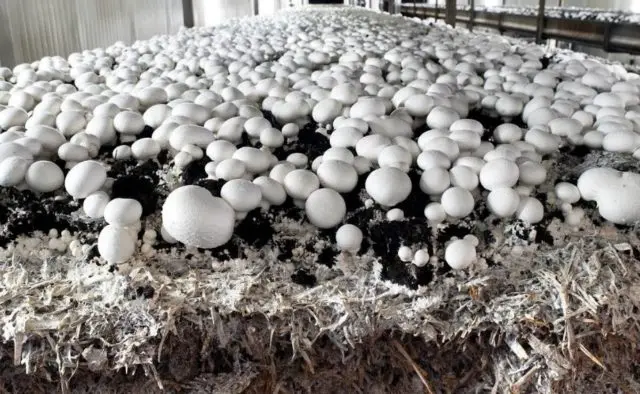
Mushrooms can be grown in shady places with high humidity.
You can also grow mushrooms outdoors, for this it is important to choose a well-shaded place (under a tree, in the shade of a house), protected from wind and direct sunlight.
Interesting Facts About Pecherica Mushrooms
There are many interesting details in the history of stoves:
- these are the first mushrooms that began to be grown in an unnatural environment for them;
- the unique properties of champignons are widely used in cosmetology: they are part of masks, lotions;
- eating pecherits well relieves fatigue;
- arginine and lysine contained in the fruiting body stimulates human mental activity;
- in terms of the amount of phosphorus, pecherits surpass even seafood.
Conclusion
In addition to the fact that meadow champignon is very tasty, it is also useful, because it is a storehouse of microelements necessary for the body. A rich mushroom aroma gives the dish a special zest, and the nutritional value of such a dish is comparable to meat.









